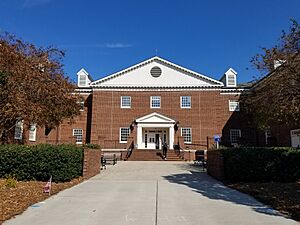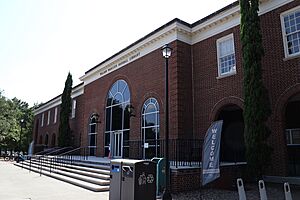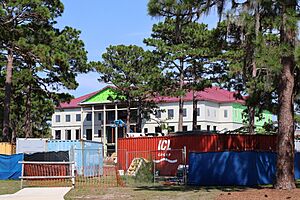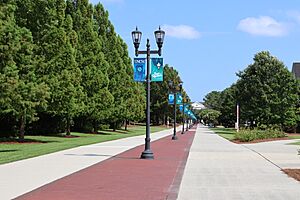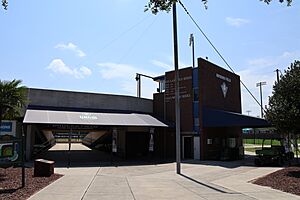University of North Carolina Wilmington facts for kids
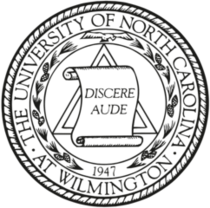 |
|
|
Former names
|
Wilmington College (1947–1969) |
|---|---|
| Motto | Discere Aude (Latin) |
|
Motto in English
|
"Dare to Learn" |
| Type | Public research university |
| Established | September 4, 1947 |
|
Parent institution
|
University of North Carolina |
| Accreditation | SACS |
|
Academic affiliations
|
CUMU |
| Endowment | $162.2 million (2024) |
| Chancellor | Aswani K. Volety |
| Provost | James J. Winebrake |
|
Academic staff
|
1,012 |
|
Administrative staff
|
1,397 |
| Students | 18,848 (Fall 2024) |
| Undergraduates | 15,254 (2024) |
| Postgraduates | 3,594 |
| Location |
,
,
United States
34°13′33″N 77°52′24″W / 34.22583°N 77.87333°W |
| Campus | Midsize city, 661 acres (2.67 km2) |
| Newspaper | The Seahawk |
| Colors | Teal, navy, and gold |
| Nickname | Seahawks |
|
Sporting affiliations
|
|
| Mascot | Sammy C. Hawk |
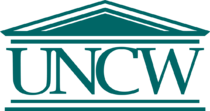 |
|
The University of North Carolina Wilmington (UNCW) is a public university located in Wilmington, North Carolina. It is part of the larger University of North Carolina system. Each year, UNCW welcomes over 18,000 students. It is known as a "research university" because it focuses on important studies and discoveries.
UNCW first opened on September 4, 1947, as Wilmington College. It began as a junior college, offering the first two years of college education. Many of its first students were veterans returning from World War II. In 1963, it became a four-year college. Then, in 1969, it officially became a university and was renamed the University of North Carolina Wilmington. Today, UNCW has three locations: its main campus in Wilmington, a campus in Jacksonville, North Carolina, and a Center for Marine Science near Myrtle Grove, North Carolina.
Contents
History of UNCW
UNCW started as Wilmington College on September 4, 1947. It was a junior college, meaning it offered courses for the first two years of college. In its first year, 238 students attended, and many were veterans. The college quickly earned important approvals, called accreditations, in 1948 and 1952. These approvals showed that the college met high standards for education.
In 1958, Wilmington College became a state-supported college. This meant the state of North Carolina helped fund it. On July 1, 1963, the college began offering four-year degrees. This was a big step!
Just six years later, on July 1, 1969, Wilmington College became a full university. It joined the University of North Carolina system. In 1977, UNCW started offering master's degree programs. This allowed students to continue their studies beyond a bachelor's degree.
Academics at UNCW
UNCW is organized into seven main colleges. Each college focuses on different subjects:
- Cameron School of Business
- College of Health and Human Services
- College of Humanities, Social Sciences, and the Arts
- College of Science and Engineering
- Watson College of Education
- Graduate School
- Honors College
The university offers many different study programs. There are 55 programs for undergraduate students (bachelor's degrees). There are also 35 master's degree programs and 6 doctoral programs for students who want to study even further.
UNCW Library Resources
The UNCW Library has two buildings. One is called Randall Hall, named after William Madison Randall. The other is Discovery Hall, which opened in 2024. This new building was part of a big expansion project.
The expansion added many new features for students. These include more study areas and computer stations. There is also a special lab for data visualization and an expanded MakerStudio. The library now has an exhibit gallery and many other helpful resources. Construction for the expansion began in May 2022. The library fully reopened in August 2024.
Special Centers and Programs
UNCW has several special centers and programs. These offer unique learning and research opportunities:
- Center for Support of Undergraduate Research and Fellowships
- Center for Teaching Excellence
- Center for Marine Science
- Center for Innovation and Entrepreneurship
- ETEAL
- Osher Lifelong Learning Institute
- Swain Center for Professional and Continuing Education
Student Life at UNCW
Campus Environment
Teal is the main school color for UNCW. Navy and gold are also used as alternate colors.
In 2018, new students joining UNCW had an average high school GPA of 4.13. Their average SAT score was 1251.
Student Facilities and Activities
The Student Recreation Center opened in 2000. It is a place for students, staff, and teachers to exercise. It has basketball courts, exercise machines, and a climbing wall. There is also a room for group activities like Yoga and Pilates. In 2012, the center became much larger. It doubled in size and added a new swimming pool area.
Lumina Theater is a movie theater on campus. It has 333 comfortable seats and a large screen. Lumina shows many different types of movies. These include popular films, independent movies, and student films. It is a great place for students to relax and enjoy a movie.
Student Housing Options
UNCW has many places for students to live on campus. There are 35 residence halls and apartment buildings. These buildings are grouped into "areas," each with a leader. The UNCW Residence Hall Association helps manage student life in the dorms.
A large group of dorms is on the south side of campus. These include Belk, Graham, Hewlett, Loggerhead, Pelican, Sandpiper, and Terrapin Halls. Almost 2,400 students live here. Galloway Hall was the first dorm built on campus. It was also the first dorm in the UNC system to have air conditioning.
Pelican Hall and Sandpiper Hall were finished in 2020. They each have space for 518 first-year students. Loggerhead and Terrapin Halls were completed in 2021. They offer 775 beds, mostly for first and second-year students.
Schwartz Hall houses 160 first-year students. Nearby are the University Suites and the Fraternity and Sorority Village. This village has seven buildings for 400 students. Different fraternities and sororities have their own special suites here.
Keystone Hall, Cornerstone Hall, and Innovation House are known as "Tri-House." These dorms were built in the late 1990s and early 2000s. They can house 465 students in total.
UNCW also has three apartment complexes on campus. These are Seahawk Village, Seahawk Crossing, and Seahawk Landing. These apartments are for graduate students and older undergraduate students. They offer two, three, or four-bedroom apartments. Seahawk Village and Seahawk Landing also have pools for residents.
Greek Life at UNCW
Fraternities and sororities are social groups at UNCW. About 9.8% of students are part of these groups. There are many different sororities on campus. The National Pan-Hellenic Council includes 6 historically black organizations. UNCW also has one Christian sorority.
Athletics at UNCW
UNCW's sports teams are called the Seahawks. The university is sometimes called "UNC by the Sea." The Seahawks are part of NCAA's Division I. They have 18 teams in total. There are 8 teams for men and 10 for women.
Men's teams include baseball, basketball, cross country, golf, soccer, swimming, tennis, and track & field. Women's teams include basketball, cross country, golf, soccer, softball, swimming, tennis, track & field, volleyball, and beach volleyball. UNCW is a member of the Coastal Athletic Association. The basketball teams play at Trask Coliseum. The baseball team plays at Brooks Field. The team colors are navy blue, teal, and gold.
Notable People
Alumni
Faculty
- Herbert Berg, Philosophy and Religion (previous faculty member)
- Clyde Edgerton, Creative Writing
- Philip Furia, Creative Writing (deceased)
- David Gessner, Creative Writing
- Peter Jurasik, Acting for the Camera
- Jason Mott, Creative Writing
- Tim Palmer, French and Japanese film studies
- Joseph R. Pawlik, Frank Hawkins Kenan Distinguished Professor of Marine Biology
- Jarrod Tanny, Charles and Hannah Block Distinguished Scholar in Jewish History
See also
 In Spanish: Universidad de Carolina del Norte en Wilmington para niños
In Spanish: Universidad de Carolina del Norte en Wilmington para niños




